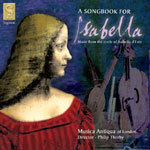
A Songbook for Isabella: Music from the circle of Isabella d'Este
 $35.00
Out of Stock
$35.00
Out of Stock6+ weeks add to cart
A Songbook for Isabella: Music from the circle of Isabella d'Este
Musica Antiqua, directed by Philip Thorby
[ Signum / CD ]
Release Date: Thursday 14 August 2003
This item is currently out of stock. It may take 6 or more weeks to obtain from when you place your order as this is a specialist product.
"there are many imaginative touches, and interpretative subtlety in abundance"
Fabrice Fitch, Early Music
'We have begun to learn the viola and we hope that we learn well enough, because in the two days only that we have been working, we have begun to plan that, when we come to Ferrara, we will be able to play tenor to Don Alfonso our brother.'
Thus, in a letter of 1499, Isabella d'Este (bride for nine years of Francesco Gonzaga, Duke of Mantua) reveals two crucial aspects of her musical patronage: that she was a participant, not merely a listener; and that she played string instruments, not wind.
Isabella's musical tastes had been formed by her upbringing in the ducal court of her father Hercule d'Este in Ferrara. Well aware of the political importance of a large musical household, Hercule maintained both a capella and court musicians under the guidance of the Brabant composer Johannes Martini. Martini was also responsible for the musical education of Hercule's children, and Isabella learned to sing and to play the lute and harpsichord. It is difficult to cut through the flattery inherent in any contemporary assessment of an aristocratic amateur, but it does seem that Isabella was genuinely gifted. After her marriage in 1490 she began to remodel the relatively modest Gonzaga musical establishment in imitation of that of her father, even asking for the loan of her old mentor Martini. And in 1499, as witness her letter, she succumbed to the new craze which had swept through the Ferraran court-the playing of consorts of the new viole in, as her brother Alfonso was to write, 'all the sizes in the world'. (Alfonso was, in 1502, to play in a consort of six viole as part of the celebration of his marriage-to Lucrezia Borgia.)
Isabella began to buy instruments (lutes, viole, keyboards) for her own use and that of her musicians. But not-emphatically not-wind instruments. She employed piffari (wind players), and wind instruments appear in the intarsia decorations of her chambers in the Mantuan palace. But it would have been inappropriate to her humanism and her sex for her to play the flute or the recorder (unlike her near contemporary Henry VIII of England). And it would have been unthinkable for someone of her status to play the crumhorn or shawm. In the battle between Pan the piper and Apollo, Isabella was uncompromisingly on the side of the mythical lyre player; and for her the lyre was best represented by the viola.
Apollo sang to his lyre, and as well as becoming the favourite vehicle for aristocratic instrumental performance, the viola was ideal for accompanying the voice. Under Isabella's patronage the tradition of improvised song accompanied by the singer on a lira da braccio (in direct imitation of Apollo) developed into the frottola, with the string accompaniment notated, and shared between two, three, or occasionally four (Forte cosa [29]) viols. In employing Italian composers, and herself performing their music, Isabella played a key role in the development of this new vernacular music, and of the consort of viole which developed alongside it.
Tracks:
La Fortuna:
1 Or su corere à 4 - anon [3:31]
2 Fortuna desperata à 4 - Antoine Busnois [1:36]
3 Facia ognon in fin che po à 4 - anon [2:23]
4 Prenez sur moy à 3 - Johannes Ockeghem [3:21]
5 Helas que pora advenire à 3 - Firminius Caron [3:13]
6 Or che son di pregion à 4 - Bartolomeo Tromboncino [3:20]
A la cazza:
7 A la pesca à 4 - Iannes Plice [2:00]
8 [Gagliarda] Peschatore - anon [0:37]
9 A la cazza à 4 - anon [1:53]
Kyrie Eleison:
10 Kyrie leison à 4 - anon [3:54]
11 Colomba senza fielle - anon [5:30]
12 Pavana regia - anon [2:06]
Carmine sine verbis I:
13 El piove à 3 - anon [1:57]
14 Si dedero à 3, à 4 - Alexander Agricola [2:33]
Ave Maris Stella:
15 Ave maris stella à 3 - anon [5:35]
La Mi La Sol:
16 La mi à 4 - Heinrich Isaac [2:16]
17 La mi la sol la mi gia vol à 4 - anon [1:40]
Viva il grand'Hercule:
18 O triumphale diamante à 4 - G.L. [1:18]
19 Tente alora à 4 - anon [0:47]
In Festo Natalis Domini:
20 Verbum caro factus est à 3 - anon [2:11]
21 Ne la digna stalla à 2 - anon [2:44]
22 Recerchar di Benedictus - anon [1:31]
23 Benedictus - anon/Isaac [2:18]
Carmine sine Verbis II:
24 Absque verbis à 3 - Heinrich Isaac [2:03]
25 Gratis acceptistis à 4 - Heinrich Isaac [1:50]
26 La Mora à 3, à 4 - Heinrich Isaac [2:27]
La Speranza:
27 In te Domine speravi à 4 - Josquin des Prez [4:21]
28 [Salterelli] Zorzi, Giorgio - anon [1:33]
29 Forte cosa è la speranza à 5 - anon [3:22]

